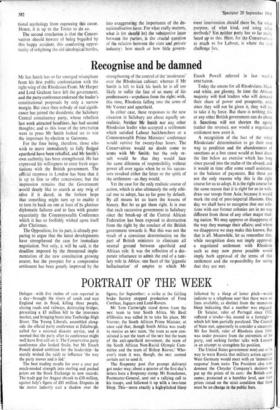Recognise and be damned
Mr Ian Smith has so far emerged triumphant from his first public confrontation with the right wing of the Rhodesian Front. Mr Harper and Lord Graham have left the government, and the party conference endorsed the leader's constitutional proposals by only a narrow margin. But since then nobody of real signifi- cance has joined the dissidents; the Salisbury Central constituency party, whose rebellion last week attracted headlines, has had second thoughts; and as this issue of the SPECTATOR went to press Mr Smith looked set to win the important by-election at Gatooma.
For the Time being, therefore, those who wish to move immediately to fully fledged apartheid have been rebuffed, and Mr Smith's own authority has been strengthened. He has expressed his willingness to enter fresh nego- tiations with the British government. The official response in London has been that it is up to him to offer concessions; but the impression remains that the Government would dearly like to snatch at any twig of olive if it dared, in the forlorn hope that something might turn up to enable it to turn its back on one at least of its glorious diplomatic failures and to face with greater equanimity the Commonwealth Conference Which it has so foolishly wished upon itself after Christmas.
The Opposition, for its part, is already pre- paring to argue that the latest developments have strengthened the case for immediate negotiation. Not only, it will be said, is the deadline imposed by the threatened imple- mentation of the new constitution growing nearer, but the prospect for a compromise settlement has been greatly improved by the strengthening of the control of the 'moderates' over the Rhodesian cabinet; whereas if Mr Smith is left to kick his heels he is all too likely to suffer the fate of so many of his predecessors—expulsion from the right; with, this time, Rhodesia falling into the arms of Mr Vorster and apartheid.
In either case, these responses to the new situation in Salisbury are about equally un- realistic. Neither Mi Smitt 114f Any other Rhodesian leader who accepted a settlement which satisfied Labour backbenchers or a Commonwealth Prime Ministers' conference would survive for twenty-four hours. The Conservatives would no doubt come to terms with Mr Smith; but the only re- sult would be _ that they would face the same dilemma of responsibility without power all over again when he or his succes- sors revoked either the letter or the spirit of the settlement—as they would.
Yet the case for the only realistic course of action, which is also ultimately the only ethi- cal one to adopt, has so far gone by default. By all means let us learn the lessons of history. But let us get them right. It is true that each successive government in Salisbury since the break-up of the Central African Federation has been exposed to destruction from the right by the conduct of the British government towards it, But this was not the result of a conscious determination on the part of British ministers to eliminate all neutral ground between apartheid and African rule. It was the reflection of a des- perate reluctance to admit the end of a tute- lary role in Africa; one facet of the 'gigantic hallucination' of empire to which Mr Enoch Powell referred in last - week's
SPECTATOR.
Today the omens for all Rhodesians, black and white, are gloomy. In time the African majority will find leaders who will demand their share of power and prosperity, and, since they will not be given it, they will try to take it by force. But there is nothing this or any other British government can do about it. Sanctions will not shorten the agony (rather the reverse), nor would a negotiated settlement now avert it.
A recognition of 'the fact of the white Rhodesians' determination to go their own way to perdition and the abandonment of sanctions as a lost cause would at least draw the line below an exercise which has long since passed into the realm of the absurd, and it would in time offer some small assistance to the balance of payments. But these are not the only reasons why this is the right course for us to adopt. It is the right course for the same reason that it is right for us to with- draw our troops from Asia; because it would mark the end of post-imperial illusions. One day we shall have to recognise that our rela- tions with our former colonies are in no way different from those of any other major trad- ing nation. We may approve or disapprove of the way they manage their affairs; and where we disapprove we may make this known. But that is all. Meanwhile, let us remember• that, while recognition does not imply approval, a negotiated settlement with Rhodesia such as may now prove possible would imply both approval of the terms of that settlement and the responsibility for seeing that they are met.










































 Previous page
Previous page